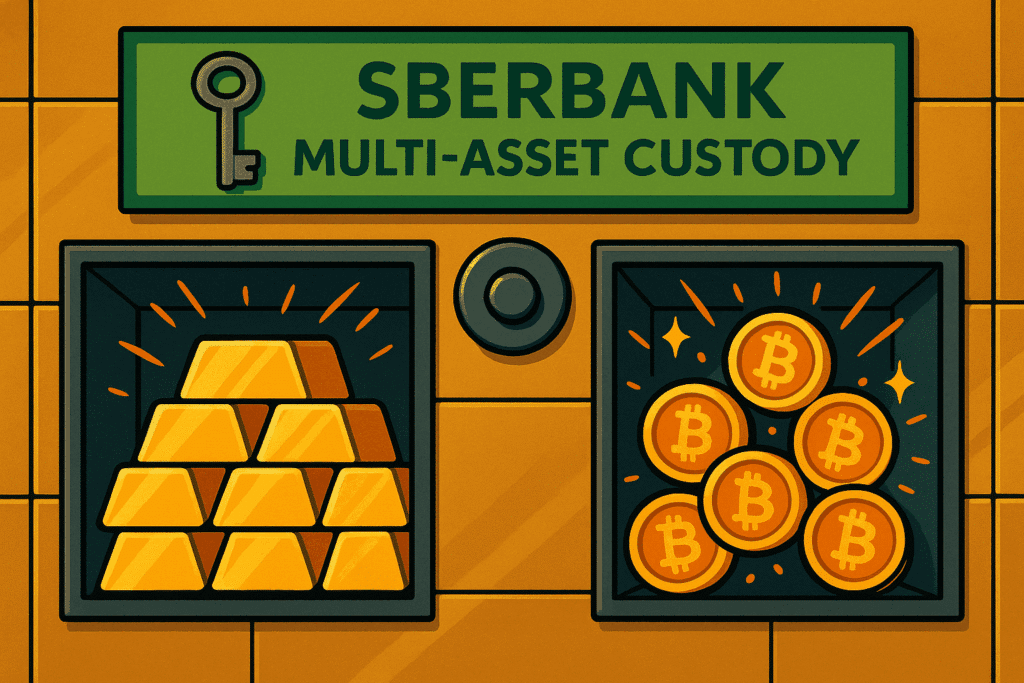
Sberbank of Russia Aims to Manage Your Cryptocurrency Like a Traditional Bank Account
Sberbank, Russia’s leading state-owned bank, is planning to officially enter the cryptocurrency arena by providing custody services for digital assets. This initiative arises as the nation gradually relaxes its regulations surrounding cryptocurrency usage, responding to increased pressure on traditional financial systems from international sanctions.
Building a Digital Vault
The bank has submitted an extensive proposal to regulatory authorities to obtain permission to act as a custodian of cryptocurrencies. This would enable Sberbank to manage customer digital assets like it currently handles cash and securities. The strategy includes protective measures for client assets and legal safeguards to support users in instances of unauthorized access or criminal activities. This is part of a broader effort to bring cryptocurrency-related services into formal banking regulations, enhancing oversight and responsibility.
🚨BREAKING: Russia’s largest bank, Sberbank, has officially launched custody services for crypto assets. (Translation: This is not retail speculation — this is state-level infrastructure for digital finance.) — Mason Blak C (@Masonblakcrypto) Twitter
Tied to Sanctions and Strategy
This move aligns with the shifting perceptions of cryptocurrency within Russia. Over the past year, the government’s stance has transitioned from skepticism to cautious acceptance, with recent legislation allowing cryptocurrencies to be utilized in international trade. Enabling a major banking player like Sberbank to manage crypto storage is a significant next step to maintain financial flows within Russia and mitigate reliance on foreign platforms, which can pose legal and political risks.
Filling a Gap in the System
Currently, many Russian investors and institutions depend on offshore services for their cryptocurrency storage, which exposes them to regulatory risks and potential interruptions. Gleb Zemskoy from Insight Finance notes that custody services are critical for serious blockchain operations. Sberbank’s plan aims to provide a secure domestic solution for crypto asset management.
Perfect Timing for a Digital Ruble
As Russia prepares for the launching of its central bank digital currency in 2026, this custody initiative could serve as a testing ground for compliance measures, infrastructure, and customer interactions. If authorized, this would allow both businesses and individuals to safely store cryptocurrencies domestically instead of relying on overseas solutions.
Not Just a Russian Trend
Sberbank is not alone in this endeavor; several prominent banks in Europe, including Deutsche Bank, are also moving to establish their own crypto custody services. This trend reflects a broader shift among traditional financial institutions towards integrating cryptocurrencies into their offerings as regulations become clearer.
What to Watch For
The central bank of Russia will need to assess Sberbank’s proposal thoroughly. A positive outcome would pave the way for officially regulated cryptocurrency services within the nation, provided that extensive technical and legal criteria are met. Given that custody platforms are often targeted by cyber threats, it’s essential for Sberbank to demonstrate its capability to safeguard customer assets.
Sberbank aims to transform into Russia’s primary institution for cryptocurrency management. This initiative represents more than just technological advancement; it signifies a strategic adaptation to create localized finance solutions in reaction to global sanctions. If successful, Russian investors might soon trust Sberbank to hold not just their rubles but also their cryptocurrency assets.


